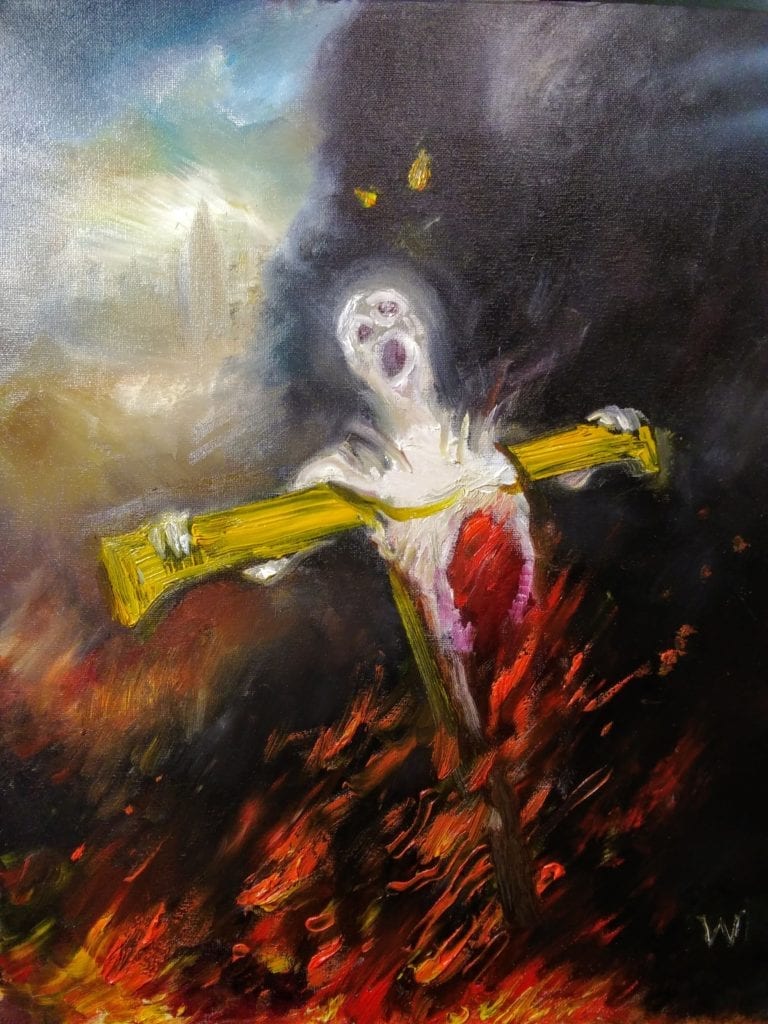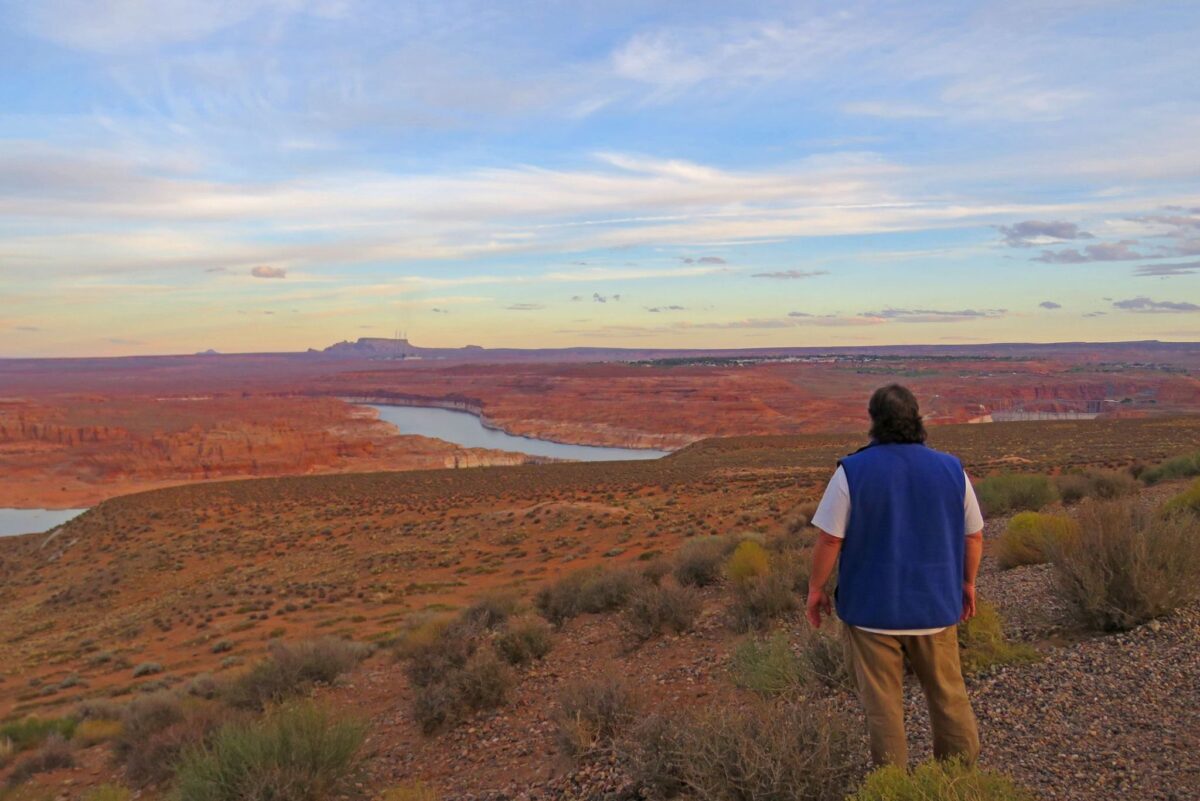“Deep in the heart of Summer, sweet is life to me still, But my heart is a lonely hunter that hunts on a lonely hill.”
– Scottish poet William Sharp, who used the pseudonym Fiona MacLeod

Existential Anxiety – Oil on canvas 16×20 – New American Journal graphic by Walter Simon [Art Market Place]
The Big Picture –
By Glynn Wilson –
WASHINGTON, D.C. — Southern writer Carson McCullers took that line from Sharp’s poem and wrote a novel with the title The Heart Is a Lonely Hunter. About a deaf man named John Singer and the people he encounters in a 1930s mill town in Georgia, it was published in 1940, the year before the United States entered World War II.
Frederic I. Carpenter wrote in The English Journal that the novel “essentially … described the struggle of all these lonely people to come to terms with their world, to become members of their society, to find human love — in short, to become mature.”
According to Google, key lines from the book include this advice.
“Do not attempt to stand alone … The most fatal thing a man can do is try to stand alone.”
But it also says this:
“All we can do is go around telling the truth.”
I guess I can relate.
The New York Times ran a column a couple of days ago trying to address the state of loneliness from a social science perspective, calling it an epidemic.
If Loneliness Is an Epidemic, How Do We Treat It?
If more than one-fifth of Americans over 18 say they often or always feel lonely or socially isolated, as the data shows, why is that? And what can they (we) do about it? Is it the same thing as depression? Or part of being depressed? And does social media help or make the problem worse?
Certainly the social isolation imposed by stay at home and keep your distance policies during the Covid-19 crisis and coronavirus global pandemic inevitably led to more loneliness. As we come back to interacting more like the so-called normal before the pandemic, many people are obviously finding it hard to come back. I know this because friends, fans and followers on Facebook have confirmed it in comments.
I know it because I’m still feeling it myself. I still recoil when people try to get too close to me, or reach out to shake my hand. After training ourselves for social distancing, it is not easy to come back to social closeness.
Among older adults, social isolation has been linked to various adverse physical and psychological effects, including increased risk of dementia and heart disease.
The article quotes a Dr. Stephanie Cacioppo who calls it a choice, but I’m not sure I’m buying it.
“It’s a choice to remain lonely or not lonely,” Dr. Cacioppo says.
Put another way, according to the authors in the Times, “Loneliness doesn’t have to be a permanent state. With the right support and a lot of determination, the brain can learn to connect again.”
As I was reading this, I thought of my late mother, who I know suffered from loneliness after her only spouse in life, my dad, died at the age of 47 when I was only 15. After retiring from the gas company in her mid-60s, she spent the next 20 years all alone in a house in the suburbs of Birmingham, Alabama. Her only respite was church on Sunday and Wednesday, when she got to interact with friends and be a part of something. She was so trusted with money she took up the collection at Wednesday night supper.
She finally died at the age of 93 in December 2019, thankfully before Covid hit.
Not being a fan of church myself, I guess I’ve always found community in bars. But for reasons that still seem beyond my control, I’ve found it hard to return to that kind of life.
So I’ve often found my solace in nature.
Yet somehow in the current moment that seems incomplete.
Interacting with friends on Facebook is no substitute for in person human interaction.
Talking to far away friends on a cell phone sometimes helps. But that too does not seem to be enough.
So I’m working on finding a solution.
Meanwhile I still feel like all I can do is “go around telling the truth.”
Even when people are not ready and don’t want to hear it or spend time thinking about it.
The Future of Humanity on Planet Earth
But I’m reminded of the closing scene in the 1960 film Inherit the Wind about the so-called Scopes Monkey Trial about evolution in Tennessee.
Science Wins Over Religion in Scopes Monkey Trial?
Spencer Tracy plays a lawyer based on Clarence Darrow and Gene Kelly plays the journalist H.L. Mencken. In the end, Tracy tells Kelly that he will die alone and no one will be there to “pull the grass up over (his) head,” because he doesn’t “believe” in anything.
But Kelly gets the last word.
“You are wrong Henry,” he says. “You’ll be there. Who else would defend my right to be lonely?”
Yet somehow this still seems like an unsatisfactory ending.
I do know this. If or I should say when there comes a time when life on Earth feels unlivable, I have no interest in hanging around to see the end.
I’ve already made arrangements to try to keep this website up long after I’m gone. Many dead publications now only exist in print in what’s left of libraries, and some may still exist for a little while longer on microfilm. For those who never embraced the web, they will one day be gone like a piece of decaying art.
Like Kilroy, I know I was here. And you do too if you’ve read this far down.
Good luck to the next generation — if there is one. They are going to need more than luck to face the hellscape coming.
I, for one, do not want to be around to see it all play out. Soon it will be time for me to go. Not today, but … I will try to let you know.
But you know what Paul wrote in First Thessalonians 5:2: “… for you know very well that the day of the Lord will come like a thief in the night.”
The Grim Reaper may sometimes appear in the same way. You never know.

That’s me looking out over the Colorado River at Grand Canyon National Park by Glenn Canyon Dam: Walter Simon
___
If you support truth in reporting with no paywall, and fearless writing with no popup ads or sponsored content, consider making a contribution today with GoFundMe or Patreon or PayPal. We just tell it like it is, no sensational clickbait or pretentious BS.













